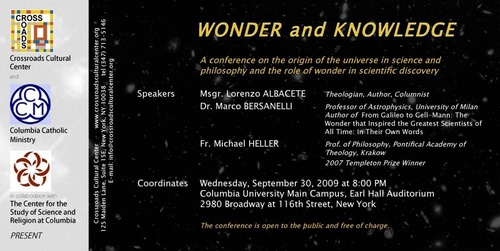The transcript for the talk on whether a scientist can be a believer that was given at a lecture hosted by the New York Encounter in January has just been released by the Crossroads Cultural Center. Faith and reason is being explored here. It is a great question to ask if a believer in Christ –or perhaps a Jew or Muslim adherent– can be credible, true to his or her being given a certain intellectual formation. Does belief in God forfeit our true search for the Divine? Monsignor Lorenzo Albacete’s portion of the discussion is the most interesting to me and it is noted below (emphasis mine). A believer sometime has to work overtime to convince him or herself that faith and science are compatible. The other day my attention was drawn to what a little girl said about Lent: her view of life and the simplicity by which we have to look everything realizing that we don’t make ourselves; everything is given. Albacete answers the question of the compatibility of faith and science: The answer, I propose, is not only yes he can, but, in fact, it is faith that will sustain his or her passion for investigating nature, and prevent the process itself and its results from becoming enslaved to political, economic, and religious ideology.Let me know what you think.
In such a case, is awe, wonder, and joy at scientific
discoveries possible? When I was thinking about this, a friend sent me the text
of a speech given by Msgr. Luigi Giussani about the “love of being” that is
remarkably appropriate to this reflection. Giussani’s argument is that the truth of Christianity can be
verified by a proper consideration of the evidence for it. Evidence, he says,
is the correct word, even if the evidence for the Christian claim is given to
us through signs. Signs are things that can be touched, seen, and experienced. The Apostles had Jesus in front of them and this presence was a sign of His
victory over death, and therefore of His mysterious identity. But what about
us? What happens with the passage of time? What signs are there for us as
evidence of the truth of the Christian claim, of the reasonableness of the
Christian claim?
The interpretation of the signs available to us engages our
liberty, he says. In this drama, our liberty is a manifestation of our love for
being. Without this love for being we are not truly free and we will never
grasp the evidence of the signs given to us. At this point, as an example of
this love for being, Giussani invokes the Magi.
Continue reading “Reality holds a signature from God … we must seek to decipher”
